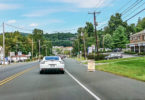The Route 22 stretch between eastern PA and Newark, NJ contains many different locales – each with their unique characteristics.
Are you an urban person who loves that the lights never go out? Or are you the type that likes peace and quiet – along with a little harder physical work? Or do you fall in between (like most of America)?
Did where you grew up affect where you live today? Same or the polar opposite?
As people who did the “big city” thing for a few decades – and decided to tone it down considerably – these thoughts pop into our head every now and then.
Especially when we need to head “back into the urban jungle” for whatever reason.
We certainly do not miss congestion.
Population density – both good and awful
We suppose the old saying is always at play: “Take the good with the bad.”
People choose glitzy city-living for the accouterments. Posh places to spend money and time. Tons of people choices. Excitement. Opportunity. Status.
So the “bad” that comes along are things like expensive, crime, frenzied, insignificance. Too much of everything!
The five-mile syndrome (or five-block syndrome) sometimes plays a role too. Instead of driving everywhere out in the sticks – some people just like the convenience factor of everything.
But even that can get old.
What is your sweet spot?
Everyone has that “just right” situation. Could be the distance to work. Or the number of social opportunities. Or privacy and serenity. And of course, the cost of living. We always strive for the perfect mix of everything. And we’re not even including the family and kids factors like schools, safety, etc.
Where some folks would thrive, could be torturous (or even impossible) for others.
Much of the time, it depends on the personality of the person.
It also varies by how much people would be willing to settle for. Unless you’re filthy rich (and can afford multiple dwellings), there are drawbacks most of the time. We learn to adapt and live with them.
Is urban living sustainable?
We’ve toyed with a theory that urban living (such as NYC or other big cities) should be a limited-time run for most normal humans. That eventually (if you’re sane), you’d eventually be done with it.
However, especially for those born into those environments – they spend their whole lives in the middle of it all. Sometimes multiple generations call big cities their home. For some, that is all they know.
But what about those who came from slower-paced locations? Having seen how other parts of the world work – does that affect their overall sentiments?
There is something about living amongst such an insane quantity of people that seems unhealthy. Even with closet-sized apartments you can “call your own” and decompress – you can’t stay hunkered down in a box for long without needing to get out.
Let’s not even talk about the societal decay that is clearly evident in every single big city!
Humans adapt – that is true
City-dwellers, for the most part, get up to speed fairly quickly. You need to in order to survive.
Everyone “ups” their game in the big metropolis. A giant competitive arena.
It certainly is true that the human is quite capable of living almost anywhere and making do for the most part. It’s not for everyone, though. But it all depends on your personal makeup.
No one size fits all for anything
We only ponder about this because it’s interesting to wonder what phase people are in. Which direction are they going?
What is on their mind? What are their goals? How did they get those viewpoints?
There are so many wishes and dreams out there, it’d be next to impossible to classify them all.
It’s hard for us to imagine how ANYONE can love sitting in traffic regularly. Or depending on flaky, unreliable public transport. How can a normal human being tolerate that? Do the “pros” outweigh the cons that much? Do they compensate by using their electronic devices to get “things” done as well as “stay in touch” with people? Doesn’t sound appealing to us, regardless of the “savior” that modern technology is.
Some aspects of certain areas can be intolerable for even the most seasoned veterans.
But like fingerprints – people are shaped in their own unique ways.
One person who is sick of hectic city living and longs to be at peace with nature will undoubtedly cross paths with another who hates country living and wants to try their luck at fame and fortune in the metropolis. Everyone can make a sound case for why their choice is the best one.
How many times does it take for you to test the “grass is always greener” theory before you settle down for good?










